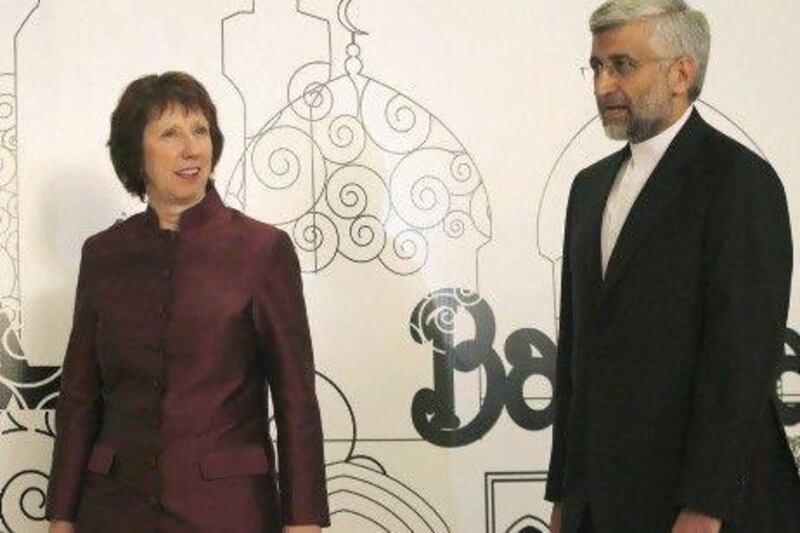World powers offered Iran a new package of incentives at high-stakes nuclear talks in Baghdad yesterday, hoping to persuade Tehran to relinquish the most sensitive parts of its atomic programme.
A deal would ease concerns that Iran is seeking a nuclear weapons capability and defuse the threat of possible war with Israel and the US.
A spokesman for Catherine Ashton, the European Union's foreign policy chief who is leading the talks for the six powers, said the proposals centred on Iran halting its attempts to enrich uranium to 20 per cent. This level of purification is within striking distance of producing bomb-grade material.
"We have a new offer on the table which addresses our main concerns about the Iranian nuclear programme. The 20 per cent enrichment question," said Michael Mann. The proposals would be "of interest" to Tehran, he added without elaborating.
He said the "mood music" between Ms Ashton and Iran's chief nuclear negotiator, Saeed Jalili "is certainly good and hopefully we can get a positive result".
An Iranian official was quoted yesterday as saying the P5+1 must "revise" proposals made in talks if negotiations are to go into another round. "The other side has to accept to revise its proposals," the official told Agence-France Presse on condition of anonymity at the talks. "The points of agreement are not yet sufficient for another round."
It was understood that the West's proposals did not meet Iran's main demand: the suspension of EU and United States sanctions targeting its vital oil and banking sectors that take effect at the end of next month. Instead, the six powers - the US, Britain, France, Russia, China and Germany (P5+1) - would forgo seeking further UN sanctions if Iran agrees to their proposals.
The West wants to maintain the pressure of its unilateral sanctions until Iran makes verifiably substantial concessions on its nuclear programme. Mr Mann said toughened sanctions, especially the EU ban on Iranian oil exports, had helped draw Iran into serious negotiations.
Even so, Iran is expected to stay at the table and negotiations appears set to run into an unscheduled second day today. Its supreme leader, Ayatollah Ali Khamenei, while viscerally mistrustful of the West, is committed to exploring whether a "win-win" solution can be achieved in what are likely to be long and laborious negotiations, analysts said.
With the ayatollah's tacit encouragement, Iran's once-sceptical state media have talked up the prospects of a deal, while insisting sanctions must be eased. Friday prayer leaders are also supporting the talks, maintaining Iran now has the upper hand and it is the West that will have to compromise.
Iran's foreign minister, Ali Akbar Salehi, said yesterday: "The ideas fielded to us speak of the fact that the other side would like to make Baghdad a success. We hope that in a day or two we can bring good news."
Tehran on Tuesday agreed in principle to allow the United Nations nuclear watchdog to restart its long-stalled investigation into suspicions that it has secretly worked on developing nuclear arms, a charge Iran denies. That agreement was seen as an attempt by Iran to strengthen its hand in the broader negotiations with the P5+1.
Iran insisted on the Iraqi capital for yesterday's summit, viewing Baghdad as friendly turf for the Iranian team. Some 15,000 Iraqi troops and police guarded the venue inside the city's heavily fortified Green Zone.
Iran said it is only enriching uranium to 20 per cent to fuel a medical research reactor producing isotopes for cancer patients. It has signalled a willingness to compromise on this if the West supplies the fuel plates it requires and accepts Iran's enrichment of uranium to 3.5 per cent to fuel civil nuclear reactors. Formal acceptance of Iran's right to a domestic nuclear fuel cycle could be vital, providing Ayatollah Khamenei with a face-saving way out of the crisis. By jettisoning 20 per cent enrichment, Iran would ease the West's immediate fears without any direct pain to its popular nuclear programme.
Iran insists its uranium enrichment programme is for peaceful purposes, rejecting western accusations it is geared towards achieving a weapons capability. Mahmoud Ahmadinejad, the Iranian president, said yesterday that "the production and use of weapons of mass destruction is haram [forbidden] and have no place … in Iran's defence doctrine".
The P5+1 and Iran agreed in Istanbul last month to be guided by a "step-by-step approach and reciprocity". Tehran interpreted these buzzwords as meaning sanctions would be lifted for each concession it may make.
Equally crucial for Tehran, Ms Ashton said a "key basis" for the negotiations would be the Nuclear Non-Proliferation Treaty (NPT). The treaty requires member states to guarantee that their nuclear activities are peaceful in return for enshrining their right to civil atomic energy.
Israel, which has repeatedly threatened military strikes against Iran's nuclear facilities, is deeply mistrustful of the nuclear talks. "All options remain on the table," Israel's defence minister, Ehud Barak, warned yesterday.
Russia said yesterday that Iran appears ready to agree specific steps to end the nearly decade-old standoff over its nuclear programme, but warned any additional US sanctions would undermine a diplomatic settlement.
Mr Obama opposes any military strike on Iran's nuclear facilities until diplomacy has been exhausted or he is convinced that Tehran is trying to build nuclear weapons.





